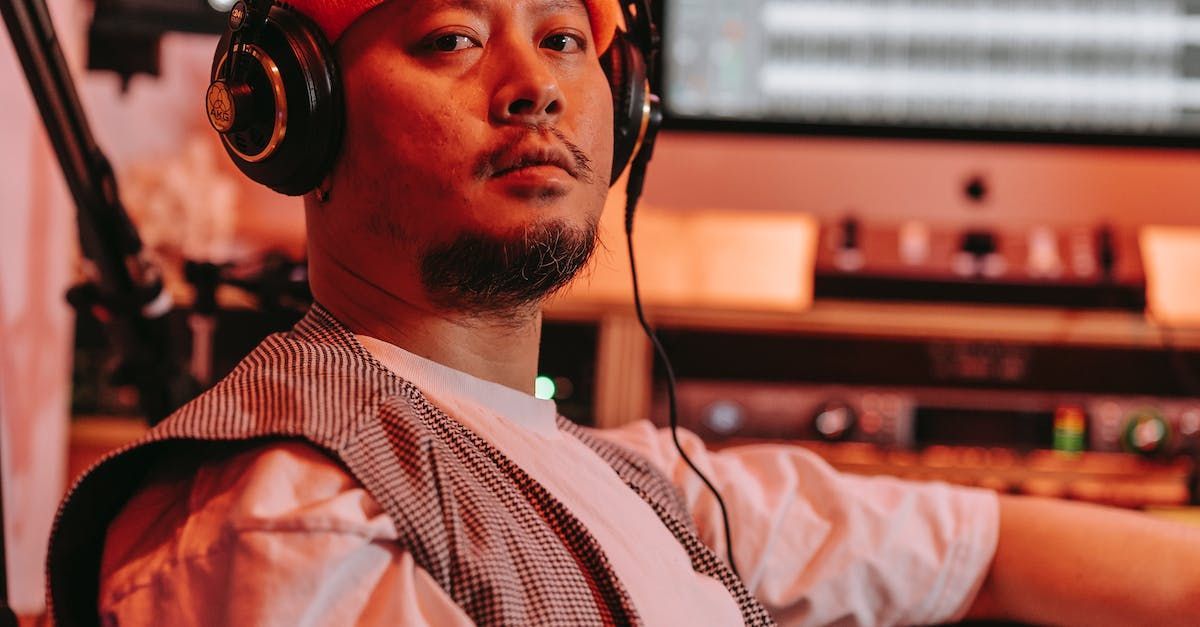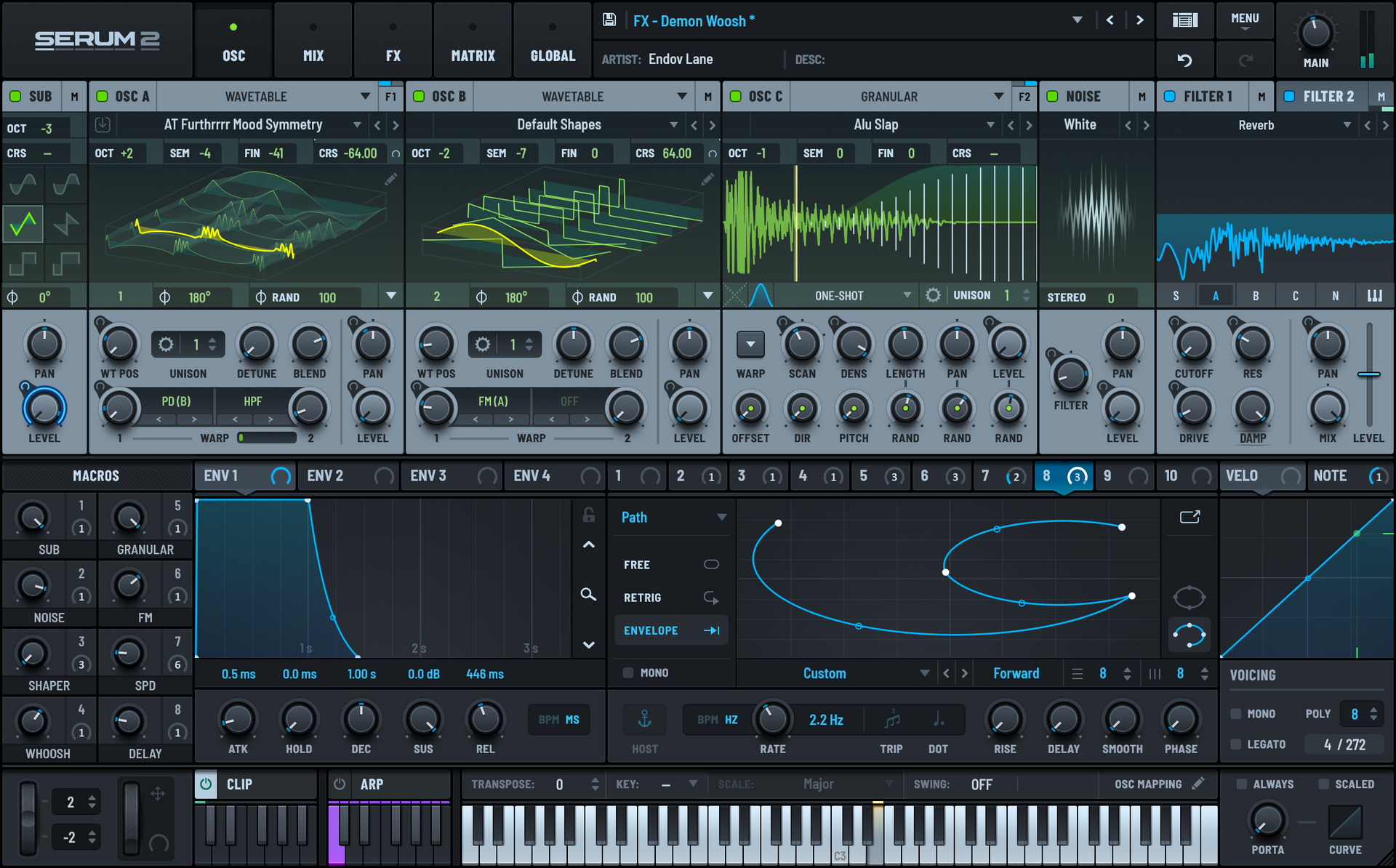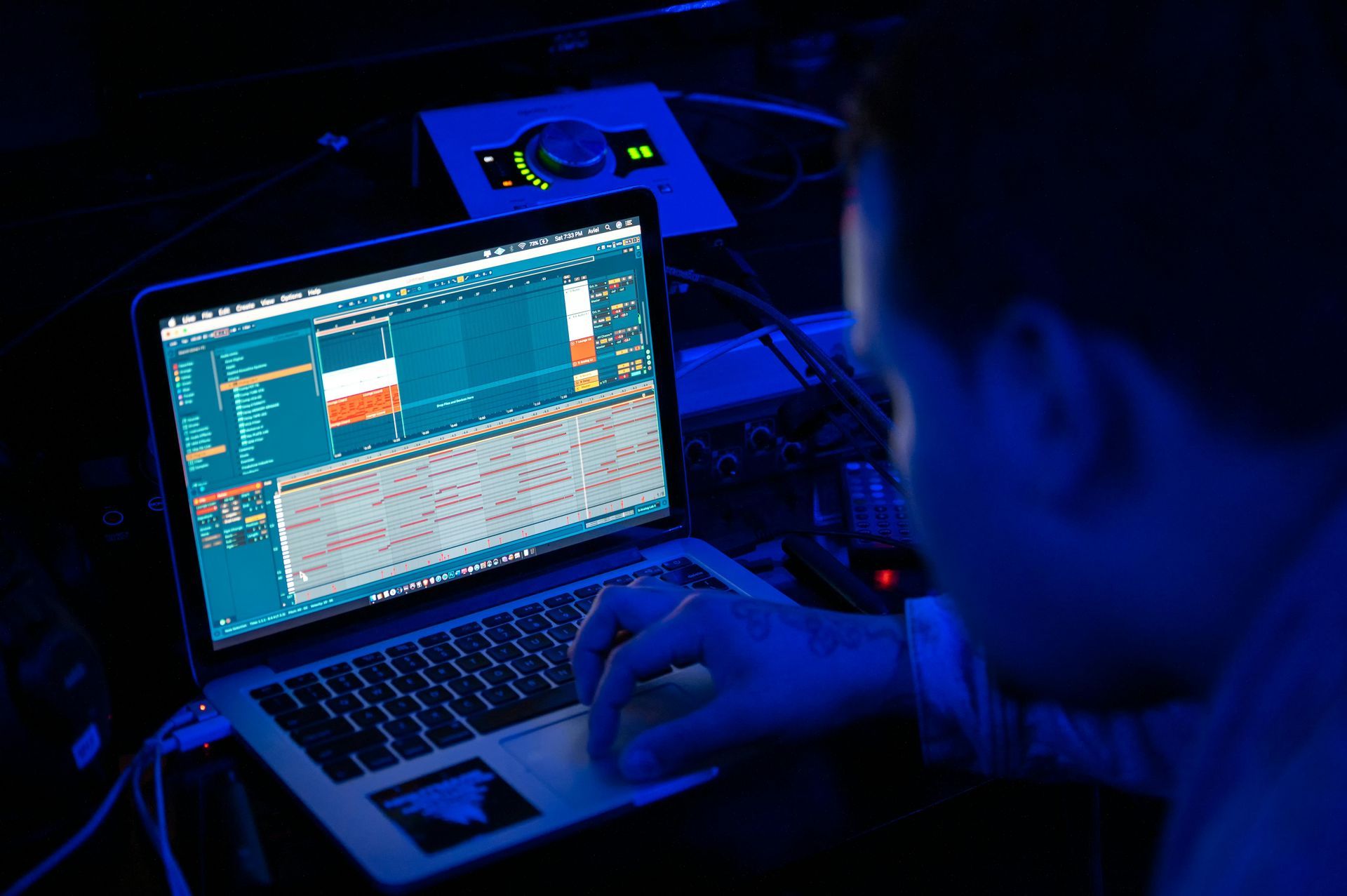Becoming a Music Producer: How to Start Your Journey
Imagine embarking on a musical journey, where each note you create paints your story with vibrant colors. Picture yourself now in a state-of-the-art studio during recording sessions, feeling the hum of creativity surging through your veins, guided by a seasoned music producer.
Start at ICON.
Here, guidance from industry experts will elevate your production and
audio engineering skills to professional levels.

Education and Training
ICON Collective empowers aspiring producers with a structured curriculum, blending theoretical knowledge with hands-on experience in audio engineering. Their program covers everything from music theory, beatmaking, digital audio workstations to mixing, mastering, audio engineering, and the business aspects of the industry, ensuring you are well-equipped for success as a future music producer.
Choosing the Right Program
Selecting the right music production program is crucial for building a solid foundation. ICON Collective offers a comprehensive curriculum that balances theory and practical experience.
Professionals lead each course, providing insights from the industry. This immersive environment, enriched with frequent recording sessions, is designed to help you develop technical skills and foster creativity.
Beyond technical skills, consider programs with a strong alumni network. ICON Collective's graduates often find success in diverse roles within the music industry, highlighting the program's efficacy. Choose wisely and invest in your future as a music producer.
Benefits of ICON Collective
ICON Collective boasts a robust curriculum designed to nurture both creativity and technical proficiency.
Their Artist Development Program emphasizes personalized mentorship, ensuring that students receive one-on-one guidance from industry professionals. This hands-on approach helps to refine artistic identity.
The school’s state-of-the-art facilities provide the perfect environment to master digital audio workstations, mixing, and mastering. Their commitment to excellence prepares students for competitive industry standards.
Networking opportunities at ICON Collective are unparalleled, featuring collaborations, guest speakers, and alumni events. These connections are vital for establishing a successful career in music production.
ICON Collective's graduates have gone on to achieve remarkable success in various sectors of the industry.
Essential Courses
Starting your journey at ICON Collective, several core courses are critical to building a strong foundation in music production.
- Music Production: Learn the intricacies of digital audio workstations (DAWs), signal flow, and creative workflows.
- Sound Design: Develop skills in synthesizing sounds, creating unique samples, and layering effects.
- Mixing and Mastering: Understand the crucial post-production processes ensuring your tracks sound professional.
- Music Theory: Gain a solid understanding of scales, chords, and song structures instrumental in producing compelling music.
- Artist Development: Focus on your unique artistic identity, branding, and establishing a coherent musical vision.
These courses equip you with the practical and creative skills necessary to navigate the complexities of the music industry.
With a focus on contemporary techniques and tools, you’ll be well-prepared to produce high-quality, market-ready tracks.
Studying at ICON Collective ensures that you receive a comprehensive education tailored to your success as a professional music producer.
Building Your Skill Set
Developing a robust skill set is imperative for a successful career in music production, and ICON Collective offers an extensive curriculum designed to hone your abilities. With hands-on training and expert guidance, you'll refine your skills in areas such as sound engineering, composition, and arrangement, ensuring you possess the versatility needed to excel in a competitive industry.
Practicing consistently and staying updated with the latest trends and technologies will further solidify your proficiency, enabling you to create innovative and impactful music.
Mastering Software Tools
Becoming proficient in industry-standard software is crucial for any aspiring music producer.
- Digital Audio Workstations (DAWs): Master software like Ableton Live, Logic Pro, and FL Studio.
- Audio Plugins and VSTs: Understand how to use virtual instruments and effect plugins.
- Audio Editing Software: Learn detailed audio editing with tools like Pro Tools and Cubase.
- Mixing and Mastering Suites: Gain expertise in software like iZotope Ozone and Waves plugins.
- Sound Design Tools: Explore unique sound creation with software like Serum and Massive.
Having a solid grasp of these tools will enable you to transform creative ideas into polished tracks.
Hands-on practice and consistent experimentation are essential for mastering these applications.
Understanding Music Theory
Music theory forms the foundation for creating harmonious and compelling compositions.
- Scales and Modes: Learn the different scales and modes to create various moods and atmospheres.
- Chord Progressions: Understand the relationships between chords to structure your tracks effectively.
- Rhythm and Time Signatures: Master timing and rhythm to bring dynamic shifts in your music.
- Melody and Harmony: Craft captivating melodies and harmonies that resonate with listeners.
- Ear Training: Develop your ear to identify pitches, intervals, and chord qualities intuitively.
A strong grasp of music theory aids in making informed creative decisions, enhancing your production quality.
At ICON Collective, music theory is integrated into a practical curriculum, enabling you to apply these concepts to real projects.
Understanding music theory is not just academic; it’s a toolset for expressing your musical vision with precision and clarity.
Developing Your Style
Developing your unique style requires patience, consistent practice, and an open-minded approach to musical influences. It's a process that evolves with each new track you produce.
ICON Collective understands the importance of this journey.
By immersing yourself in diverse genres, analyzing their structures, and experimenting with different elements, your distinctive sound will begin to surface.
ICON Collective encourages exploration through a curriculum designed to push creative boundaries.
An important part of finding your style is regular feedback from experienced industry professionals, helping you refine and perfect your creations.
Ultimately, the aim is to develop a style that’s recognizably yours. ICON Collective provides the tools and environment to support this essential aspect of your musical development.
Gaining Practical Experience
ICON Collective's curriculum emphasizes hands-on learning, a cornerstone of music production. Through their coursework, students engage directly with cutting-edge software, hardware, and real-world scenarios, blending theory with practice.
In addition to classroom experiences, students can participate in "collab sessions." These provide a taste of actual studio work, fostering collaboration and networking opportunities. By the end, the experience of these sessions makes students feel prepared to enter the professional music world with confidence.
Internships and Apprenticeships
One of the most effective ways to gain practical experience is through internships and apprenticeships.
These opportunities allow you to learn directly from seasoned professionals.
By working in real-world environments, such as recording sessions, you'll develop a deeper understanding of the music industry's operations, workflow, and expectations.
Additionally, internships and apprenticeships provide invaluable networking opportunities that can lead to future career prospects. It's not just about learning; it’s about immersing yourself in the industry, building relationships, and positioning yourself for success. Whether you’re interning at a recording studio or apprenticing with a seasoned record producer, these experiences lay the groundwork for your professional journey.
Networking in the Industry
Networking is vital for a successful music career, whether you aim to be a music producer, artist, or sound engineer.
Building strong relationships with industry professionals, including a record producer or two, opens many doors. It allows you to gain insights from experienced producers, managers, and artists, as well as access opportunities that might not be publicly advertised. Effective networking can foster collaborations, lead to job offers, and provide the guidance needed to thrive.
Attend industry events and masterclasses whenever possible.
These settings create perfect opportunities to introduce yourself, exchange contact information, and foster meaningful connections. Don’t underestimate the power of social media—platforms like LinkedIn and Instagram are invaluable tools for expanding your professional network and showcasing your work.
Remember, networking is about quality, not quantity. Focus on developing genuine relationships rather than collecting a list of contacts. Treat each interaction seriously, and always follow up to build and maintain these connections. By valuing each professional relationship, you'll create a supportive network that will bolster your career in music production.
Hands-on Projects
Hands-on projects at ICON Collective provide students with practical experience in music production. This approach ensures that theoretical knowledge is effectively applied.
Small class sizes allow instructors to give personalized feedback essential for skill development. This feedback is crucial for refining your techniques.
During these projects, students work on real-world assignments designed to simulate industry conditions. This experience helps bridge the gap between academic learning and professional application.
Instructors, often industry veterans, offer mentorship to guide you through the intricacies of music production. By the end of your studies, you'll compile a portfolio showcasing your ability to produce, mix, and master tracks that meet industry standards.
Establishing Your Brand
Developing your brand as a music producer is crucial for distinguishing your unique sound and artistic vision. This involves curating your online presence, creating visuals, and using consistent messaging to ensure fans recognize your style.
Tools like social media and personal websites are essential for these efforts, helping to amplify your visibility and engagement within the music industry.
Creating an Online Presence
In today's digital age, establishing an online presence is vital for any music producer. Social media platforms like Instagram, Twitter, TikTok, and YouTube provide powerful tools for engaging with your audience, showcasing your work, and building a community around your music.
A professionally designed website acts as your digital business card. It's crucial to have a centralized platform where industry professionals can learn more about your projects and credentials.
Furthermore, leveraging streaming platforms such as Spotify, Apple Music, and SoundCloud, allows you to distribute your music effortlessly. Consistently updating and maintaining your profiles on these platforms maximizes your reach and helps cultivate an engaged listener base.
Connecting with other artists, producers, and industry insiders through online forums and networking events can yield significant collaborative opportunities. Engage in meaningful conversations to broaden your industry network.
Consistent content creation is essential for sustaining audience interest. Whether it’s through sharing behind-the-scenes footage, new releases, or educational content, maintaining a steady flow of posts keeps your audience connected and invested in your journey.
Lastly, remember that your online presence isn't just about self-promotion. Genuine engagement, such as replying to comments and participating in community discussions, builds loyalty and enriches your relationship with your audience.
Marketing Your Music
Creating a strong brand identity is paramount, alongside crafting a unique narrative for your musical creations. This identity should be consistently reflected across your online platforms.
In this digital era, visual content is powerful. Invest in high-quality artwork and videos to accompany your releases.
An optimized website serves as your digital business card. It should house essential information, your discography, and direct links to your social media and streaming profiles.
Collaborations and features with other artists can amplify your reach significantly. Consider strategic partnerships that complement your sound and style.
Email marketing remains a potent tool for engaging with your audience. Building and maintaining an email list allows for personalized communication regarding new releases, tour dates, and special offers.
Analytics are invaluable for refining your strategy. Utilize platform-specific insights to understand your audience's demographics and preferences, enabling more targeted marketing efforts.
Collaborating with Artists
Collaborating with artists can yield transformative results, enriching your sound, enhancing your creative vision, and increasing your network's reach in the music industry.
First, establish a rapport that fosters trust and mutual respect.
Secondly, clearly communicate your expectations, goals, and creative direction to avoid misunderstandings.
Third, understand the unique style and preferences of the artist you are working with.
Fourth, use a collaborative approach that balances both parties' creative inputs, fostering a synergistic outcome.
Fifth, utilize project management tools and regular check-ins to ensure the collaboration stays on track, addressing any issues promptly.
Finally, remember that flexibility is key; be open to exploring new ideas and adjusting your original plans to create the best possible music.
What do you need to become a music producer?
Passion and Dedication
Your journey begins with a genuine love for music. This deep-seated enthusiasm will fuel your perseverance through the challenging and diverse aspects of music production.
Having a solid grasp of music theory and audio fundamentals is crucial. Without this foundation, you may struggle to understand how various elements come together to create a cohesive sound. With time, you’ll master the intricacies of melodies, harmonies, and rhythms.
Technical Proficiency
You'll need to become proficient with Digital Audio Workstations (DAWs). These software platforms are the heart of modern music production. Each DAW has a unique interface and set of features, so find one that resonates with you and invest time in mastering it.
Being a Creative Visionary
Creativity and innovation are the core of effective production. Strive to develop a unique voice by experimenting with different genres, sounds, and production techniques.
Finally, networking with other professionals is invaluable. Surround yourself with experienced individuals who can provide insights, feedback, and opportunities to collaborate, helping you grow and refine your craft.
What do music producers do?
Music producers are the invisible architects behind many of the songs you love. They shape the sound, feel, and flow of a track, often collaborating closely with artists to achieve a polished final product.
They oversee recording sessions, providing critical direction and feedback.
Producers also handle arrangement, editing, and mixing tasks to enhance the sonic quality and impact of a piece.
In addition to their technical roles, producers are often responsible for budgeting and scheduling, ensuring that the project remains on track and within financial constraints. It's not uncommon for producers to act as “coaches” to artists, nurturing their vision and performance.
What skills define a great music producer?
A great music producer possesses an intimate understanding of both musical theory and current industry trends. This comprehensive knowledge allows them to guide the creative process effectively while ensuring the music resonates with a contemporary audience.
Technical proficiency with digital audio workstations (DAWs) and various recording equipment is crucial. Mastery of tools such as Pro Tools, Logic Pro, and Ableton Live enables producers to realize their artistic vision and optimize the sound quality.
In addition to technical skills, the ability to communicate and collaborate is essential. Producers work with artists, engineers, and other stakeholders, and must be adept at translating abstract musical ideas into actionable plans. Strong interpersonal skills facilitate this dynamic process.
Critical listening and attention to detail are equally important. A producer must be able to identify subtle nuances in a mix, understand the impact of different sound elements, and make informed decisions to enhance the final product.
Lastly, a great music producer exhibits creativity and innovation. The ability to push boundaries and experiment with new sounds is vital in producing music that is both unique and commercially viable.
Read more: Discover 5 common mistakes new music producers make and learn how to improve your music production skills. Get essential tips for beginners and avoid critical errors in your music productions.



